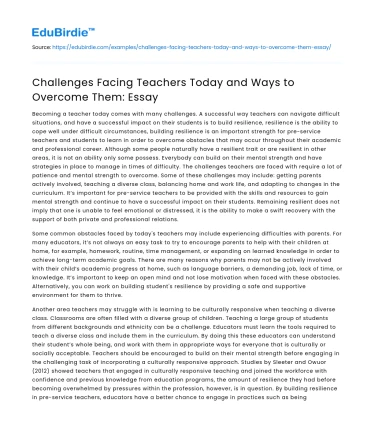Becoming a teacher today comes with many challenges. A successful way teachers can navigate difficult situations, and have a successful impact on their students is to build resilience, resilience is the ability to cope well under difficult circumstances, building resilience is an important strength for pre-service teachers and students to learn in order to overcome obstacles that may occur throughout their academic and professional career. Although some people naturally have a resilient trait or are resilient in other areas, it is not an ability only some possess. Everybody can build on their mental strength and have strategies in place to manage in times of difficulty. The challenges teachers are faced with require a lot of patience and mental strength to overcome. Some of these challenges may include: getting parents actively involved, teaching a diverse class, balancing home and work life, and adapting to changes in the curriculum. It’s important for pre-service teachers to be provided with the skills and resources to gain mental strength and continue to have a successful impact on their students. Remaining resilient does not imply that one is unable to feel emotional or distressed, it is the ability to make a swift recovery with the support of both private and professional relations.
Some common obstacles faced by today's teachers may include experiencing difficulties with parents. For many educators, it’s not always an easy task to try to encourage parents to help with their children at home, for example, homework, routine, time management, or expanding on learned knowledge in order to achieve long-term academic goals. There are many reasons why parents may not be actively involved with their child’s academic progress at home, such as language barriers, a demanding job, lack of time, or knowledge. It’s important to keep an open mind and not lose motivation when faced with these obstacles. Alternatively, you can work on building student's resilience by providing a safe and supportive environment for them to thrive.
Save your time!
We can take care of your essay
- Proper editing and formatting
- Free revision, title page, and bibliography
- Flexible prices and money-back guarantee
Another area teachers may struggle with is learning to be culturally responsive when teaching a diverse class. Classrooms are often filled with a diverse group of children. Teaching a large group of students from different backgrounds and ethnicity can be a challenge. Educators must learn the tools required to teach a diverse class and include them in the curriculum. By doing this these educators can understand their student’s whole being, and work with them in appropriate ways for everyone that is culturally or socially acceptable. Teachers should be encouraged to build on their mental strength before engaging in the challenging task of incorporating a culturally responsive approach. Studies by Sleeter and Owuor (2012) showed teachers that engaged in culturally responsive teaching and joined the workforce with confidence and previous knowledge from education programs, the amount of resilience they had before becoming overwhelmed by pressures within the profession, however, is in question. By building resilience in pre-service teachers, educators have a better chance to engage in practices such as being culturally responsive and coping well with changes.
Curriculum changes are common in the school system. Being flexible and open to learning new ways is a trait to learn or build on. Communities that support and respect teachers have the strongest impact on education (Power et al., 1997). Having support and good communication with employees will assist with adjusting to change. Good support networks in your private life are also important to achieve a healthy balance between your work and private life. The question remains, how we can build resilience and be mentally strong when overcoming these challenges?
There are many ways to maintain mentally strong. A strong supportive community is important. The first step is to acknowledge who your support networks are (family, friends, mentors, co-workers). Having friends, colleagues, and family around to support you through the journey is important. It is crucial to have access to emotional support in different areas of your life. Support in the home could be having help with domestic duties or a listening ear, social outings with friends and regular physical exercise will help your emotional well-being and mental health. It’s important to have a good work environment and create support networks by building positive relationships with co-workers inside and outside of work. Joining online social platforms is also a great way to meet like-minded people and share ideas and advice. Access to programs such as BRiTE Modules or lectures can help educators with their professional development and reflect on their progress. As described by Author J.Jorden connection plays a bigger role when building resilience than a person's personal resilient trait (Jordan & Le Cornu, as cited in Le Cornu et al., 2009).
A concerning growing number of teachers are leaving their jobs as educators due to the countless challenges. A staggering 18% of teachers will leave the workforce within the first five years due to the pressure and workload, according to news reports (Weale et al., 2019). The focus on building resilience in pre-service teachers is to improve the likelihood of teachers staying on and making a difference to both the education system and their students. With the tools and mental strength to push forward past all the new challenges arising in the 21st century, teachers can equip their students and themselves with strategies and skills to overcome the ongoing problem we are facing today, as well as help create an environment with a strong supportive community. As Colin Power has empathized, equipping pre-service teachers with the skills and resources to practice resilience and teach their students how to remain resilient through support networks and programs is the aim to get successful results within the educational system.






 Stuck on your essay?
Stuck on your essay?

